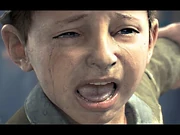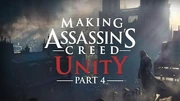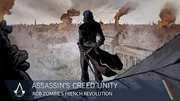Assassin's Creed Black Flag Multiplayer Co Op Mod
- "It is sometimes hard to remember how easy life was, before the world changed. Now people are starving in the streets and those with the will to fight back are imprisoned... or worse. The life I had is gone. The world I knew with it. Amongst the violence, amongst the chaos, I will find justice no matter the cost. If we've been betrayed from within, I have to do this myself."
- ―Arno Dorian, Assassin's Creed: Unity Story Trailer.
Assassin's Creed: Unity is a 2014 sandbox action adventure game, and a sequel to 2013's Assassin's Creed IV: Black Flag, the game has the player take on the role of an Initiate as they explore the story of Arno Dorian, who joins the Assassins to investigate the murder of his adoptive father on behalf of his adoptive sister Élise de la Serre, a member of the Templars.
The game was released on 11 November 2014 in North America, 13 November in Europe and 14 November in the UK. It is available for PlayStation 4, Xbox One, and PC.[2]
Assassin's Creed: Unity is set primarily in Paris during the French Revolution in the late 18th century, with two additional areas in Versailles and Saint-Denis.
Contents
- 1 Gameplay
- 1.1 Locations and navigation
- 1.2 Memories
- 1.3 Customization
- 1.4 Cooperative play
- 1.5 Other
- 2 Synopsis
- 2.1 Plot
- 2.2 Cast
- 3 Development
- 4 Controversy
- 5 Editions
- 6 Marketing
- 7 Gallery
- 8 Appearances
- 9 References
Gameplay
As the game is exclusive to next-generation consoles and PC, it will enable renderings of Paris to 1:1 scale and crowds numbering in the thousands. Players will able to explore the city's entirety, including seamless interiors and the catacombs of Paris, with landmarks like Notre-Dame having a quarter of the building's interior playable. Even empty buildings may have unlockable rooms with treasures inside.[3] [4] [5] When standing on rooftops, a button can display 3D objects like alarm bells to help the player strategize.[6]
Haystacks have been largely removed in favor of allowing players to control their descent from rooftops, and the controls for freerunning up and down are now separate.[7] Social Stealth has been improved upon with a special crouching mode activated by button, and combat has been made more tactical to feel more realistic: counter kills were removed.[3]
Assassinations in the game are referred to as "black box missions," and harken to the style of gameplay from the first Assassin's Creed. Contextual clues are provided to allow the player to choose and plan their own approach, rather than follow a linear, pre-determined path to the target. Unlike previous games however, an assassination is not deemed successful until Arno has escaped after performing it.[8]
Memories
For memories, instead of the player being given a series of objectives, Ubisoft has developed the Adaptive Mission Mechanic, which gives players several potential paths to complete a mission. For example, choosing to stalk a target will lead to a chase if they detect you, as opposed to causing desynchronization.[4]
Customization
The Assassins' weapons and appearance are customizable, while experience gained can be spent on four different specialties: "Melee" (offense), "Health" (defense), "Ranged" (navigation), and stealth.[9] For example, Arno can possess Eagle Pulse, which allows him to sense how many guards are in a location he intends to infiltrate. Like other skills, it can be upgraded with experience points at the player's discretion.[10] He can also unlock a disguise skill to escape pursuing guards. The player will be able to upgrade all of Arno's skills, given his objective is to become a Master Assassin.[11]
There are around 200 choices for Arno's gear, which can benefit gameplay:
- Hoods can decrease a guard's reaction time as well as increase the radius of Eagle Sense.
- Chest items refer to the Assassins' robes, which changing can increase the time you can spend blended in the crowd, and the time it takes for a guard to detect you.
- Arm items change the appearance of the Hidden Blade, increasing melee damage and the Phantom Blade's ammunition, but can also increase the time it takes to revive allies.
- Belts and sashes increase the number of health points and items carried.
- Pants and boots can decrease fall damage and running noises, as well as providing extra health.[9]
Cooperative play
- "Assassins do not only embark on their own quests (like Ezio avenging his family), they have to pay their dues to the Assassin council. So players will have to complete what we call Brotherhood missions, in shared experience, to fulfill their duties towards the Assassins."
- ―Alex Amancio discussing the reason behind cooperative gameplay.[[src]]
Following the success of Wolfpack in Assassin's Creed III and Assassin's Creed IV: Black Flag, Assassin's Creed: Unity is the first game in the series to introduce campaign co-op. Up to four players can take on story-based missions including sabotaging an execution, protecting an emperor or assassinating a target.[2] However, the co-op missions will be optional, all story-based, and can be completed singularly as well.[5]
Co-operative gameplay starts at taverns, where the player can see a "ghost" of a friend who is also playing. Approaching said ghost can establish a request to join the friend on their mission, and both will be loaded to the mission's nearest checkpoint.[7] Amancio expects players will spend a third of their time in co-op mode.[3]
Players can unlock skills that will benefit a whole group: these include the Disguise skill, Group Healing, the Assassin Cache for sharing bombs and ammunition, and Communal Sense, which colors targets' locations across the whole map.[12]
There are heist missions for the Assassins to steal money. The more an Assassin is detected, the less money will be gained. Amancio commented that the co-op missions will encourage players to work together, thereby avoiding a session from falling apart with gamers who refuse to co-operate.[11]
Players can also roam around together in open world co-op and do several puzzles together such as the Nostradamus Enigmas.
Other
The modern day portion returned, using Abstergo Entertainment's "Helix" video game console that allows users to play and view genetic memories. The player is playing as a user who is streaming Arno's memories through the help of Assassins Bishop and Shaun, with Bishop being the person who directly talks to him. They show him a stolen internal Abstergo video that explains scientists discovering rare DNA with triple helix (instead of the normal double) that come from Sages. The video states that if they find enough they could build a memory sequence that shows the locations of the Pieces of Eden. The Assassins are looking for the Sage that Arno met at some point in his life. At some points in the game there are server sweeps where Arno has to run into a portal before the user is discovered by Abstergo. He then goes through a linear level of Paris in different years such The Belle Époque. and the Second World War. He then has to go through the portal to return to the simulation.[12]
Unity is the first game in the Assassin's Creed series to lack the competitive multiplayer, since its initiation in Brotherhood.[5]
Synopsis
Plot
In 2014, a Helix user explored the memories of a Templar in the service of Jacques de Molay. The memory takes place in 13 October 1307, in the Temple in Paris, which was being attacked by the forces of King Philip the Fair. Alerted by the ensuing battle, Jacques tasked his advisor to hide the Sword of Eden and the Codex Pater Intellectus. Running through the battlefield, the advisor took notice of an Assassin, Thomas de Carneillon. After a sword fight with Thomas, the advisor returned the Sword and Codex to their resting place in the Temple. As the advisor left the room, he noticed Jacques had been captured. However, before he could rescue the Grand Master, the advisor was stopped by Thomas, who killed him with his Hidden Blade. Seven years later, Jacques and his affiliates were set to be burned at the stake. Before perishing, Jacques cursed the Pope and King overseeing his execution. With his death, the Templar Order was publicly disbanded.
Suddenly, the memory was interrupted by the transmission of an Assassin, who introduced herself as Bishop. She explained to them that they were being manipulated by Abstergo to sift through memories, following which she asked them to experience an unsequenced set of Arno Dorian's memories as an introduction to the Assassins and Templars.
In 1776, eight-year-old Arno accompanied his father, Charles Dorian, on a business trip in the Palace of Versailles. While waiting for his father on a chair, Arno saw a girl running away, and followed her. After Arno stole an apple for her, the girl introduced herself as Élise de la Serre. Suddenly, a commotion was heard. Arno followed the crowd and found his father's body laid on the floor. Charles Dorian was assassinated, leaving his son an orphan under the care of Templar Grand Master François de la Serre.
Thirteen years later, Arno was at De la Serre estate performing chores when De la Serre left in a carriage. Then, an exhausted Templar messenger, Perrault, caught up to Arno, having a letter needed to be urgently delivered to De la Serre. Arno took the letter and chased after the carriage, but failed to deliver the message to François de la Serre.
Arno then learned of a party at the Palace of Versailles where Élise was. After slidding the letter under De la Serre's office's door. Arno put on a suit and infiltrated the Palace to find Élise. After sharing a romantic moment with her, Arno and Élise were then interrupted by a guard, and Élise told Arno to leave. On his way out, Arno spotted De la Serre, who fell to the ground, dead. Charles Gabriel Sivert came from behind a wall and then framed Arno for the murder. Arno was taken by the guards and subsequently imprisoned in the Bastille.
Arno found himself in a cell with four other men. After his first night in prison, he saw one of the prisoners holding his father's watch, and tried to take it back. The prisoner handed Arno a wooden training sword, and the two dueled. Arno called his attention to a wall painted with unusual symbols. The prisioner acknowledged Arno's Eagle Vision, and after learning his surname, introduced himself as Pierre Bellec, revealing that his late father was an Assassin before returning the watch and offering to train Arno.
Two months later, Bellec and Arno were still training, while a great commotion was taking place outside. The Bastille was stormed by revolutionaries, and Bellec and Arno took the opportunity to escape. Days later, he made his way to the de la Serre estate in search of Élise, who assumed he was responsible for her father's death. Élise handed Arno the letter he was supposed to deliver to her father, warning him of betrayal from someone within the Templar Order. After learning about his unwitting role in his stepfather's death, Arno decided to seek out the Assassin Brotherhood. After finding Bellec and meeting the Assassin Council, Arno was inducted into the Parisian Brotherhood of Assassins.
Bishop then showed up and offered the user a chance to join the Assassins. Once they accepted, Bishop showed them footage of Abstergo's Phoenix Project, explaining that the Templars were searching for Sages both in the present and the past to map the Precursor genome. As Arno had encountered a Sage at some point during his lifetime, Bishop was hoping to have the Initiate find the Sage's remains before Abstergo, through Arno's memories. Bishop then allowed the Initiate to proceed.
Arno rendezvoused with Bellec on a rooftop near the Conciergerie for his last exercise before becoming a fully fledged Assassin, where he learned that Sivert would be at Notre-Dame the next day. Arno was tasked with finding and assassinating Sivert. Arno infiltrated the church entered the confessional, impersonating Sivert's accomplice, Duchesneau, in order to gain information from Sivert. Having gained the necessary information, Arno thrust his arm through the lattice and stabbed Sivert in the throat with his Hidden Blade, killing the Templar. Arno then viewed Sivert's memories, and learned the identity of his partner-in-crime on the night of De la Serre's murder, the Roi des Thunes.
Arno informed the Assassin Council of his discovery, where he was given the Phantom Blade and tasked with finding and assassinating the Roi des Thunes. Arno left for the Cour des Miracles and investigated a commotion, where he found a beggar having his foot forcibly amputated by the Roi des Thunes' lieutenant, Aloys la Touche. Just as he was about to intervene, Donatien Alphonse François, Marquis de Sade, advised him against it, suggesting instead that Arno followed La Touche to his master. Arno found and interrogated him, discovering the hiding place of the Roi des Thunes. Arno entered the sewers and started making his way towards the Roi des Thunes. Arno managed to assassinate his target, and with the Roi des Thunes dead, De Sade took over his position immediately. He then informed Arno that François-Thomas Germain had crafted the pin used to kill François de la Serre.
The Council tasked Arno with investigating the silversmith, Germain. Arno infiltrated the workshop and found Germain, who claimed being held against his will for months. Arno escorted Germain outside, who retributed telling Arno that he made the pin for a man called Chrétien Lafrenière. While investigating Lafrenière, Arno destroyed his gunpowder supply and discovered where to find his target. Arno arrived at the Holy Innocents' Cemetery to assassinate Lafrenière, the man he believed to be responsible for François de la Serre's death. Arno assassinated Lafrenière and, through his memories, he discovered that Lafrenière was planning to attack the Hôtel de Beauvais in force.
Arno returned to the Council, and informed them of Lafrenière's involvement in De la Serre's murder. The Council tasked Arno with finding and assassinating Lafrenière, but he informed them that he already did, much to their indignation. Although initially scolded for his assassination of Lafrenière, Arno was allowed to continue his investigation. Arno reached the Hôtel de Beauvais. By eavesdropping on a Templar meeting, he learned of a planned ambush on Élise. Arno reunited with Élise and rescued her from the Templar ambush. He then instructed her to meet him at the Café Théâtre.
Arno met with Élise at the Café Théâtre and convinced her to join forces with the Brotherhood to find her father's killer. Élise was brought before the Assassin Council, although she was unable to land an agreement with them. While Mirabeau convened with the Council, Arno informed her of Germain. Élise informed Arno that Germain was exiled from the Templar Order for his radical views and heretical notions about Jacques de Molay. Investigating Germain's residence, they discovered him to be her father's killer. While planning to inform Mirabeau of Germain's true identity, Arno and Élise found him murdered. After an investigation, they deduced that the killer was likely an Assassin. Arno followed a lead to the Sainte-Chapelle, and discovered Mirabeau's killer to be Bellec. He had done this because he strongly believed that no peace could be achieved between the Assassins and the Templars, and that purging the Brotherhood to remake it into a stronger organization was a good thing. Bellec attempted to convince Arno to join his cause, but Arno refused, and forced into a duel, Arno reluctantly killed his former mentor.
Arno met with the Assassin Council for his next assignment. The Council learned that Mirabeau was in contact with the King and tasks Arno to find the letters he sent before they're made public. Arno infiltrated the Tuileries Palace, and while disposing of Mirabeau's correspondence with the King Louis, Arno met artillery officer Napoleon Bonaparte. After escaping the Tuileries with him, Arno was able to gain his assistance in tracking down Captain Frédéric Rouille. Arno reached the Grand Châtelet, where Rouille and his men were executing prisoners. Arno tracked down and assassinated Rouille. Through his memories, he learned of a Templar plot to starve France and incite riots, led by a woman named Marie Lévesque.
Arno met with Élise at Le Marais, and informed her of Lévesque's plan. Stealing a set of orders from the captain of a grain barge, he discovered that Lévesque would be at the Luxembourg Palace. Arno infiltrated the Palace and assassinated Lévesque. Through her memories, he learned of a plot to execute King Louis, undertaken by Louis-Michel le Peletier. Arno and Élise escaped the area in a hot air balloon. They then shared a night of passion.
Seeking to find and kill Le Peletier, Arno and Élise met with the Marquis de Sade at the Louvre, who informed them that Le Peletier could be found at the Palais-Royal. Arno tracked down and assassinated Le Peletier. Through his memories, he learned that Germain would be present at King Louis' execution the following morning.
At King Louis' execution, Arno met with Élise near the Place de la Révolution, intending to assassinate Germain. Louis XVI was executed, and Arno failed to assassinate Germain since he refused to let Élise take on the Grand Master's bodyguards alone. This caused her to question his devotion to avenging her father. As a result, she cut off contact with Arno.
As Arno returned to the Assassin hideout, he was stopped by two Assassins and escorted to the Council. Due to Arno defying orders to abandon Germain's investigation and his obsession for revenge, the Council expelled Arno from the Brotherhood. Months later, he had moved back to the De la Serre estate in Versailles and returned drinking. While attempting to find his missing watch, Élise found him and convinced him to resume their mission.
As Aloys la Touche hosted executions at the town square, Arno set out to rid Versailles of his terror over the town. Arno assassinated la Touche and, through his memories, he learned that Maximilien de Robespierre, leader of the Reign of Terror, was Germain's final conspirator.
Arno and Élise drove back to Paris, seeking to find Germain through Robespierre at the Festival of the Supreme Being. They managed to plant incriminating evidence on several people, discrediting Robespierre and turning popular opinion against him. Once Germain abandoned him, it would be easy to acquire information from Robespierre. Robespierre was arrested, but he broke free of his imprisonment and sought shelter from the last vestiges of his allies in France. Arno and Élise found and interrogated Robespierre, learning that Germain was hiding in the Temple. Robespierre was arrested again and sent to be executed the following morning.
Arno and Élise infiltrated the Temple to find Germain. Upon Arno locating him, Germain used the Sword of Eden to fire a burst of electricity at him. After a fight at the Temple's central tower, Germain fled to the catacombs. Arno entered the catacombs and found the entrance to the Templar vault. Élise then appeared and distracted Germain, allowing Arno to attack. Élise then fought Germain alone, but the Sword's power was rendered unstable. The Sword exploded, killing Élise and mortally wounding Germain in the process. In an act of grief, Arno slowly assassinated Germain by stabbing him in the throat with his Hidden Blade. In a vision following his death, Germain explained his struggle of being a Sage, and his beliefs in de Molay's and Élise's unfortunate deaths. As Germain finally succumbed to his wounds, Arno carried Élise's body out from the Temple, leaving behind Germain's lifeless body inside.
Some time later, Arno, as a Master Assassin, walked through Paris, and reflected on his own beliefs about the Creed not being a grant of permission to do as he would, but a warning that everyone is responsible for their actions and its consequences. In 1808, Arno entered the Temple once more, accompanied by Napoleon. There, they discovered Germain's corpse which had long since decayed, and buried his skeletal remains in the Catacombs of Paris. This left Bishop satisfied, as the bones would be difficult for Abstergo to locate and were likely too degraded for DNA extraction. Bishop praised the Initiate for his work and promised to contact them again.
Cast
- Dan Jeannotte as Arno Dorian
- Catherine Bérubé as Élise de la Serre
- Anthony Lemke as Pierre Bellec
- Alex Ivanovici as Donatien Alphonse François, Marquis de Sade
- Brent Skagford as Napoleon Bonaparte
- Harry Standjofski as Honoré Gabriel Riqueti, comte de Mirabeau
- Mary Katherine Harvey as Sophie Trenet
- Timothy Watson as Hervé Quemar
- Mizinga Mwinga as Guillaume Beylier
- Stephen Beckett as Charles Dorian
- Kate Todd as Bishop
- Bruce Dinsmore as Maximilien de Robespierre
- Alain Goulem as Charles Gabriel Sivert
- Amber Goldfarb as Marie Levesque
- Ivan Sherry as Roi des Thunes
- Olivier Lamarche as Aloys la Touche
- Noel Burton as Chrétien Lafrenière
- James Loye as Frédéric Rouille
- Julian Casey as François-Thomas Germain
Development
Assassin's Creed: Unity began development in 2010 as Assassin's Creed: Brotherhood wrapped up development.[13] Ubisoft's Montreal-based team, in conjunction with nine other studios from Toronto, Kiev, Singapore, Shanghai, Annecy, Montpellier, Bucharest, Quebec, and Chengdu worked on the game.[14]
The creative director was Alexandre Amancio, who also served in that capacity on 2011's Assassin's Creed: Revelations. He was offered the French Revolution game before taking the job of creative director on Revelations. After shipping that game, he was exhausted and took a job in advertising before returning to Ubisoft on Unity in June 2012.[15] [16]
Amancio aimed to utilize the then next-generation console technology to push the boundaries of storytelling, and having an engaging love story without making it become a secondary storyline. He cited Ico and Passage as video games that successfully placed romance at the center of gameplay, but noted those were far less complex than an Assassin's Creed game.[17]
Travis Stout wrote the single player story, Ceri Young wrote the co-op missions, and Russell Lees scripted the single-player side missions.[18] The historical characters have been mostly relegated to the side missions, leaving Stout to concentrate on writing a story focusing on Arno.[19]
French historian Dr. Jean Clement Martin acted as script consultant. According to the series' primary historical advisor Maxime Durand, he aided in ensuring the story did not feel too Royalist despite critiquing the Revolution.[20]
The game uses a rebuilt Anvil game engine utilizing the Theatre, Zen and City Lights tools, which respectively improve animation, asset management and volumetric lighting.[3] Quebec professor Laurent Turcot advised developers on the look of 18th century Paris, advising them to look at contemporary paintings and engravings in recreating the past. Nicolas-Jean-Baptiste Raguenet's paintings were emulated for the appearance of the city's water.[20]
Unity has crowds numbering in the thousands, with new animations and behaviors, such as holding hands or chatting to each other, enhancing their believability. When Arno sees crowds from a distance, the civilians' animation rigs are simplified, but as he gets closer, their "bones" increase and their behavior becomes more complex.[21]
Amancio explained the game's characters speak in English accents because unlike previous games, where accents distinguished characters and reminded players where they are from, it is clear to the player that the characters in Unity are French so using those accents was deemed unnecessary.[22]
Unlike previous installments, the soundtrack of Unity was developed by three composers: Chris Tilton, Ryan Amon, and Sarah Schachner.[23]
Controversy
The development team had intended for players to choose the co-op characters' gender, but it was abandoned due to time constraints. "It's double the animations, it's double the voices, all that stuff and double the visual assets", Amancio explained. "Especially because we have customizable assassins. It was really a lot of extra production work."[24]
This caused an immediate uproar of anger from many fans of the series. EvenAssassin's Creed III animation director Jonathan Cooper criticized this reason, stating, "In my educated opinion, I would estimate this to be a day or two's work. Not a replacement of 8000 animations",[25] explaining "Walk/run cycles and idles are the easiest way to define a character. Everything else is androgynous."[26] He also revealed Aveline de Grandpré shared more animations with Ratonhnhaké:ton than Edward Kenway did.[27]
In response, Ubisoft issued the following statement:
- "Assassin's Creed Unity is focused on the story of the lead character, Arno. Whether playing by yourself or with the co-op shared experiences, you the gamer will always be playing as Arno, complete with his broad range of gear and skill sets that will make you feel unique. With regard to diversity in our playable Assassins, we've featured Aveline, Connor, Adéwalé and Altaïr in Assassin's Creed games and we continue to look at showcasing diverse characters. We look forward to introducing you to some of the strong female characters in Assassin's Creed Unity."
The game shipped with many bugs and glitches, leading Ubisoft to apologize by offering the Dead Kings DLC for free. Later patches stabilized game performance and also allowed players to acquire legacy items without needing the companion app or an account on the Initiates website.
Editions
To date, Ubisoft has announced several collector's editions of Assassin's Creed: Unity. The Gold Edition is no longer available as the Season Pass has been removed.

- A retail copy of Assassin's Creed: Unity.
- A collector's box.
- A replica of Arno's pocket watch.
- An exclusive weapon: the Parade Pistol.
- One exclusive single player mission: The Chemical Revolution.

- A retail copy of Assassin's Creed: Unity.
- A jumbo steel case.
- A copy of the official soundtrack.
- A copy of the official artbook.
- Two lithographs.
- Two exclusive single player missions: Chemical Revolution and American Prisoner.

- A retail copy of Assassin's Creed: Unity.
- A collector's box.
- A copy of the official soundtrack.
- A copy of the official artbook.
- A 16" Arno figurine.
- A music box.
- Two exclusive single player missions: Chemical Revolution and Killed by Science.

- A retail copy of Assassin's Creed: Unity.
- An exclusive weapon: the Razorhead Spear.
- One exclusive single player mission: Chemical Revolution.
- A "Spin to Win" opportunity.

- A retail copy of Assassin's Creed: Unity.
- A collector's box.
- A FuturePak case.
- A copy of the official soundtrack.
- A copy of the official artbook.
- A 41cm Arno guillotine figurine.
- A secret Paris map.
- A framed canvas print.
- Two lithographs.
- A customized tarot card game.
- A music box.
- Two exclusive single player missions.
- Exclusive weapons and outfits.

- A retail copy of Assassin's Creed: Unity.
- A collector's box.
- A copy of the official soundtrack.
- A copy of the official artbook.
- A 39.5cm Arno gargoyle figurine.
- Two exclusive single player mission: Chemical Revolution and American Prisoner.

- A retail copy of Assassin's Creed: Unity.
- One exclusive single player mission: Chemical Revolution.
- Royal Arsenal exclusive weapons and outfits pack.
Marketing
For the 2014 San Diego Comic-Con, Ubisoft designed an obstacle course, where parkour experts and stuntmen were on hand to help fans recreate the freerunning moves they will see in the game. An animated trailer debuted there was produced by Rob Zombie, designed by Tony Moore and narrated by Féodor Atkine.[28]
Gallery

Assassin's Creed Unity Sneak Peek Video

Assassin's Creed Unity - Launch trailer
Assassin's Creed Unity Official E3 2014 Single Player Commented Demo US
Assassin's Creed Unity Official E3 2014 Co-op Commented Demo US

Assassin's Creed Unity Cinematic Trailer

Assassin's Creed Unity E3 2014 World Premiere Cinematic Trailer UK

Assassin's Creed Unity Introduction to Arno US

Assassin's Creed Unity Revolution Gameplay Trailer

Assassin's Creed Unity Inside The Revolution UK

Making Assassin's Creed Unity Part 1 - A New Beginning

Making Assassin's Creed Unity Part 2 - Next Generation Technology

Making Assassin's Creed Unity Part 3 - Assassins in Paris

Making Assassin's Creed Unity Part 4 - Gameplay Evolution

Assassin's Creed Unity Experience Trailer 1 New Engine, New Gameplay

Assassin's Creed Unity Rob Zombie's French Revolution Ubisoft NA

Assassin's Creed Unity Arno Master Assassin CG Trailer

Assassin's Creed Unity Paris Horizon Gamescom Trailer North America
Assassin's Creed Unity Gamescom 2014 Commented Solo Demo US
Assassin's Creed Unity Co-op Heist Mission Commented Demo US

Assassin's Creed Unity Co-Op Gameplay Trailer US

Assassin's Creed Unity Season Pass Trailer US

Assassin's Creed Unity Experience Trailer 2 Customization & Co-op UK

Assassin's Creed Unity Story Trailer UK

Assassin's Creed Unity Cast of Characters Trailer US

Assassin's Creed Unity Experience 3 Immersive Open World Activities US

Assassin's Creed Unity Time Anomaly Trailer

Assassin's Creed Unity 101 Trailer US
Appearances
References
| Assassin's Creed series | |||
|---|---|---|---|
| Main games | Assassin's Creed • Assassin's Creed II • Brotherhood • Revelations • Assassin's Creed III • Black Flag • Rogue • Unity • Syndicate • Origins • Odyssey • Valhalla | ||
| Spin-off games | Altaïr's Chronicles • Bloodlines • Discovery • Project Legacy • Recollection • Liberation • Pirates • Memories • Chronicles (China | India | Russia) • Identity • Rebellion • Freerunners | ||
| Compilations | Ezio Trilogy • Anthology • Heritage Collection • The Americas Collection • The Ezio Collection • The Rebel Collection | ||
| Novels | Renaissance • Brotherhood • The Secret Crusade • Revelations • Forsaken • Black Flag • Unity • Underworld • Last Descendants series (Last Descendants | Tomb of the Khan | Fate of the Gods) • Heresy • The Official Movie Novelization • Desert Oath • Odyssey • The Ming Storm series (The Ming Storm • The Desert Storm) • Geirmund's Saga • Fragments series (The Blade of Aizu | The Highlands Children | Les Sorcières des Landes) • The Silk Road • The Imperial Jade Seal series (Prophecy of the Emperor) • Sword of the White Horse
| ||
| Comics | Assassin's Creed • The Fall • The Chain • Awakening • Brahman • Assassins • Templars • Last Descendants – Locus • Conspiracies • Uprising • Reflections • Origins • Bloodstone • Blade of Shao Jun • Dynasty • Song of Glory • Blood Brothers • Valhalla (webcomic) • Valhalla (graphic novel) • Webtoon | ||
| Non-fiction | Assassin's Creed guide/artbook/CE artbook • Assassin's Creed II guide/artbook/CE artbook • Brotherhood guide/artbook • Revelations guide/artbook • Encyclopedia • Assassin's Creed III guide/artbook • Black Flag guide/artbook/CE artbook • Rogue guide/artbook • Unity guide/artbook/CE artbook • The Complete Visual History • Syndicate guide/artbook/CE artbook • A Walk Through History • The Official Coloring Book • The Essential Guide • Movie Posters • Into the Animus • Incredibuilds • The Official Collection • Origins guide/artbook/CE artbook • Infographics • The Culinary Codex • Odyssey guide/artbook/CE artbook • Covers Collection • Complete Character Guide • 2500 Years of History • Atlas • Discovery Book (Ancient Egypt | Ancient Greece) • Where's the Assassin? • Valhalla artbook • Escape Room Puzzle Book | ||
| Films & Television | Lineage • Ascendance • Embers • French Revolution • The Syndicate • Assassin's Creed • Live-action TV series • Animated TV series • Anime series | ||
| Websites | Project Legacy • Abstergo.com • Discover Your Legacy • Initiates • Assassin's Creed Pirates Demo • Council • Who's In Your Blood? • Your Blood Is Not Your Own | ||
| Board Games | Arena • Monopoly • Vendetta • Top Trumps • Risk • Brotherhood of Venice | ||
| Virtual Reality Experiences | The VR Experience • Escape the Lost Pyramid • The Temple of Anubis • Beyond Medusa's Gate | ||
| Cancelled media | The Invisible Imam • The Eye of Heaven • Lost Legacy • Utopia • Bloodsail • Alliance | ||
| Assassin's Creed: Unity | |||||||||
|---|---|---|---|---|---|---|---|---|---|
| Characters |
| ||||||||
| Factions | Assassins (Parisian Brotherhood) • Templars (Abstergo Industries | Parisian Rite • Cult of the Supreme Being • Austrian Rite) • Austria (Austrian Army) • Cult of Baphomet • France (French Army • Extremists • Girondists • Jacobins • National Guard • Raiders • Royalists) | ||||||||
| Locations | Paris (La Bièvre • Cour des Miracles • Île de la Cité • Les Invalides • Le Louvre • Le Marais • Le Quartier Latin • Ventre de Paris) • Saint-Denis • Versailles (Palace of Versailles) | ||||||||
| Events | French Revolution (Estates-General of 1789 • Storming of the Bastille • Women's March on Versailles • French Revolutionary Wars • 10 August • September Massacres • Execution of Louis XVI • Reign of Terror • Thermidorian Reaction • 13 Vendémiaire • Plot of the rue Saint-Nicaise) | Persecution of the Templars | ||||||||
| Terms and concepts | Achievements • Companion App • Customization • Dual-wielding • Eagle Vision • Eavesdropping • Genetic memory • Helix • Lanterns • Leap of Faith • Lockpicking • Memories • Outfits • Pieces of Eden (Apples of Eden • Swords of Eden) • Social Stealth • Skills • Treasure chests • Viewpoints | ||||||||
| Weapons and tools | Firearms (Guillotine Gun) • Templar pin • Heavy weapons • Hidden Blade (Phantom Blade) • Long weapons • Swords | ||||||||
| DLC | American Prisoner • The Chemical Revolution • Dead Kings • Killed by Science | ||||||||
Assassin's Creed Black Flag Multiplayer Co Op Mod
Source: https://assassinscreed.fandom.com/wiki/Assassin%27s_Creed:_Unity